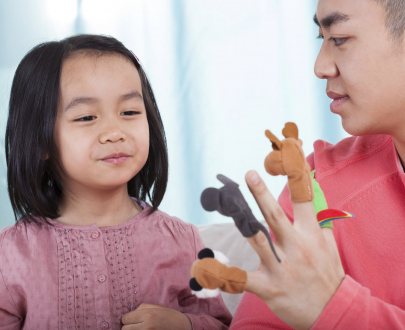 Choose your words wisely, and use them often!
Choose your words wisely, and use them often!
Studies of young children’s emotional development show that words that children hear, particularly at home, are powerful tools for nurturing empathy, emotional management and helping behaviours. Research reveals that when young children hear words that label emotions or help to describe feelings, it bolsters their ability to be attentive to other people’s emotions, show concern, be more helpful and have a wider emotional vocabulary themselves.
Surrounding children with emotion words requires two things; quantity and quality.
In this case, more is better! Include many emotion words, often. One study[1] examined how often their parents “labeled” and explained emotions to their toddlers. The researchers found that when parents encouraged children to label other people’s emotions (for example describing a character in a storybook), it was associated with more empathy-driven helping (as opposed to the child simply following directions).
The effectiveness of the words, however, increases when adults pair “teaching the words” with relationship building activities such conversations, reading books, singing songs, playing and sharing about the day.
Conversations: When mothers discussed feelings[2] during family interactions with preschoolers, the children demonstrated stronger emotional management.
Play: Toddlers whose mothers more often explained a doll’s emotions[3] or asked the children to label the doll’s emotions showed more attentiveness and concern in unrelated situations.
Reading: Researchers coded all the emotion related words parents used while reading age-appropriate picture books[1]. The results showed that the children who helped and shared more quickly and more often had parents who more often asked the child to label or explain an emotion depicted in the story.
Make talking about feelings normal in the family, learn new words to describe emotions together, and help your child find ways to label emotions they see in others and experience themselves.
Conversations between mothers and their young children were coded for emotional references and emotion-laden advice about peer interactions. Those children that had been engaged in more conversations about emotions showed stronger emotional management among their peers.
In this study, researchers made the connection between how mothers' talked about emotions to the empathy behaviours in their toddlers. Situations where a mother explained a doll’s emotions or asked the child to label the doll’s emotions resulted in the child being more attentive to and concerned about an adult’s distress.
Researchers looked at how and how much parents’ talk about emotions is associated with sharing and helping in toddlers.
"Results showed that children who helped and shared more quickly and more often, especially in tasks that required more complex emotion understanding, had parents who more often asked them to label and explain the emotions depicted in the books. Moreover, it was parents’ elicitation of children’s talk about emotions rather than parents’ own production of emotion labels and explanations that explained children’s prosocial behavior, even after controlling for age."